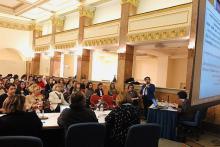Gender Mechanisms in Academia Discussed
In the workshop organized by Sabancı University Gender and Women's Studies Center of Excellence and the Raoul Wallenberg Institute, women in academia were discussed from equality mechanisms to combating sexual harassment.
Academics, civil society representatives, gender and women's studies research and application centers' staff and volunteers from different provinces came together at the workshop "Gender Equality Mechanisms and Examples of Institutionalization in Universities".
The workshop was organized by Sabancı University Gender and Women's Studies Center of Excellence and the Raoul Wallenberg Institute.
At the workshop held at Sabancı University's Minerva Han campus, the participants discussed gender equality, ways to institutionalize gender equality in universities, obstacles faced, and future-oriented goals.
In their opening speeches, Şirin Tekinay, Vice President of Sabancı University for Research and Development, and İlhami Alkan Olsson, Director of Raoul Wallenberg Institute Turkey, emphasized the importance of gender equality mechanisms and institutional mechanisms in universities.
In her speech, Şirin Tekinay pointed out that the Times Higher Education Rankings would assess universities against the United Nations’ Sustainable Development Goals, and that gender equality was among the goals that Sabancı University has chosen as a criterion for itself.
Equality mechanisms research
In their opening speeches, Gülru Göker and Aslı Polatdemir presented their research on gender equality mechanisms in different universities.
They gave a number of examples of gender mechanisms in higher education from different universities and discussed these universities' gender action plans and the sustainability of the mechanisms established within this framework, and addressed being a woman in academia from different perspectives.
Combating sexual harassment
In the third panel of the day, Yıldız Ecevit, Elif Ekin Akşit and Olcay Karacan talked about gender policies in higher education and the committees and mechanisms established to combat sexual harassment and assault, based on the cases of their own universities.
In this panel, the speakers emphasized that action plans and raising gender awareness in universities should be the main target. They also drew attention to the action plans to combat sexual harassment and assault at universities.
"We Need Innovative Projects"
The Workshop also enabled a discussion on European Union supported projects carried out in universities. Şevkat Bahar Özvarış, Türküler Erdost, Ayşe Ayata, Mary Lou O'Neil, Bahar Aldanmaz, Alper Açık and Serhat Uyurkulak talked about such projects.
They discussed the action plans made as a result of EU-supported projects, the ways gender and women's studies centers followed in implementing these projects at universities, and their own plans for the future.
They especially emphasized the necessity of innovative and sustainable projects.
Awareness
The last panel of the meeting, with Özlem Şahin Güngör, Dilek Akbulut, Leyla Kahraman, Selda Tuncer and Ayşe Gül Altınay as the speakers, was titled "Combating Sexism and Sexual Harassment in University: Types and Examples of Solidarity."
The panelists especially drew attention to the necessity of cooperation between universities and collectives in order to raise awareness of gender equality in universities and ensure that it becomes permanent in the institutional structure.
They discussed how necessary it was to have having female administrators at the top positions of the institutional ladder of universities and to disseminate in-university training, and addressed methods of overcoming institutional barriers.
Active participation of the student
At the end of the workshop, academics, students, civil society representatives, gender and women's studies research and application centers' staff and volunteers agreed on the importance of meeting and communicating on a common platform with centers and individuals working to create gender awareness in different higher education institutions.
They also drew attention to the importance of active and informed participation of students in awareness studies and action plans.
Source: Bianet.org
